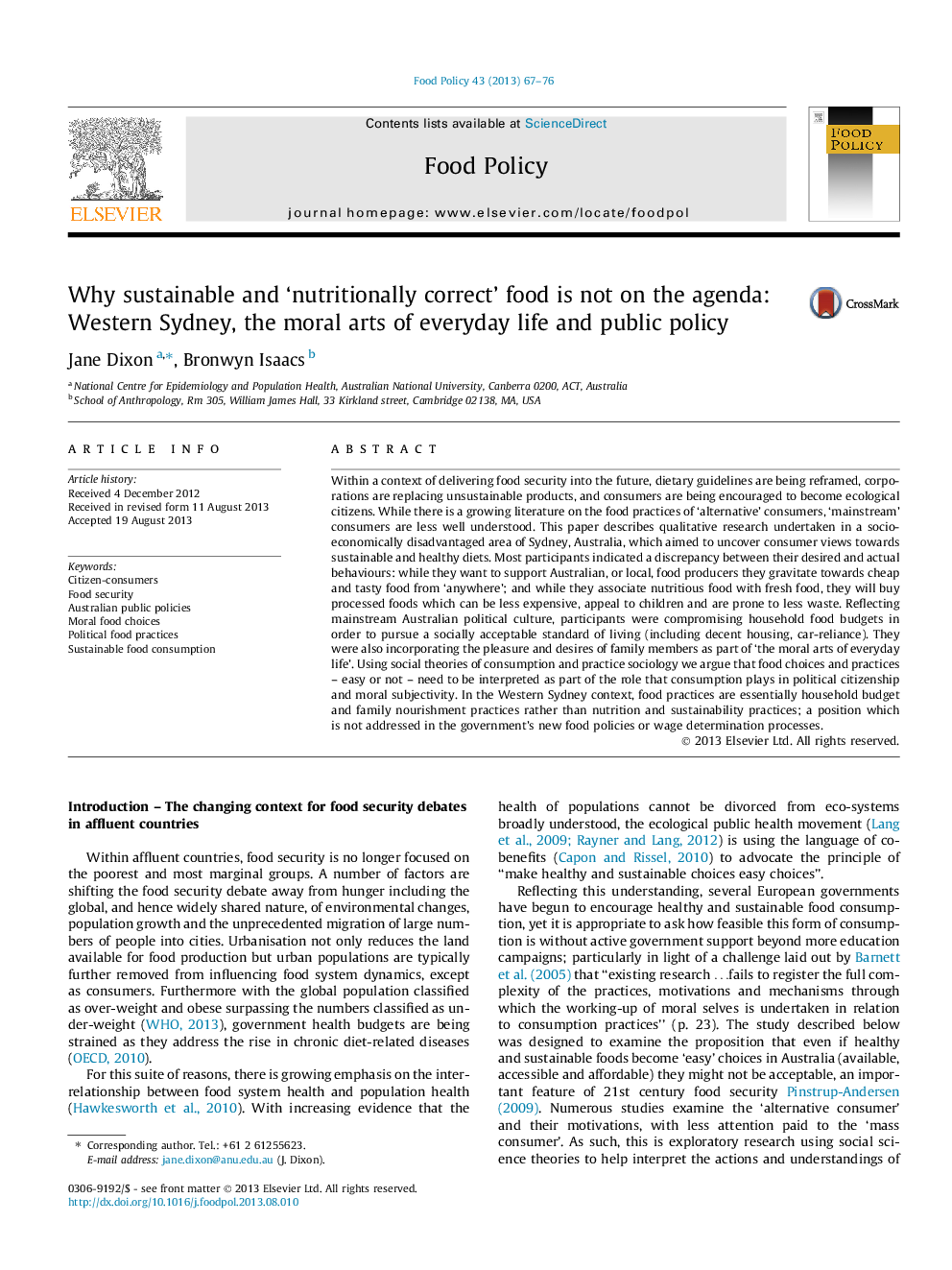| کد مقاله | کد نشریه | سال انتشار | مقاله انگلیسی | نسخه تمام متن |
|---|---|---|---|---|
| 5070589 | 1477032 | 2013 | 10 صفحه PDF | دانلود رایگان |
عنوان انگلیسی مقاله ISI
Why sustainable and 'nutritionally correct' food is not on the agenda: Western Sydney, the moral arts of everyday life and public policy
ترجمه فارسی عنوان
چرا غذای پایدار و "تغذیه صحیح" در دستور کار نیست: سیدنی غربی، هنر اخلاقی زندگی روزمره و سیاست عمومی
دانلود مقاله + سفارش ترجمه
دانلود مقاله ISI انگلیسی
رایگان برای ایرانیان
کلمات کلیدی
شهروندان مصرف کننده، امنیت غذایی، سیاست های عمومی استرالیا، انتخاب غذایی اخلاقی، شیوه های غذایی سیاسی، مصرف مواد غذایی پایدار،
ترجمه چکیده
در چهارچوب ارائه امنیت غذایی در آینده، رهنمودهای تغذیه ای در حال تغییر است، شرکت ها جایگزین محصولات ناپایدار می شوند و مصرف کنندگان به شهروندان اکولوژیکی تشویق می شوند. در حالی که ادبیات در حال رشد در مورد شیوه های مصرف مواد مصرفی "جایگزین" وجود دارد، مصرف کنندگان "جریان اصلی" به خوبی درک نمی کنند. این مقاله، تحقیق کیفی را در منطقه محروم اجتماعی و اقتصادی در سیدنی، استرالیا انجام داد که هدف آن کشف دیدگاه های مصرف کننده نسبت به رژیم های سالم و سالم بود. اکثر شرکت کنندگان اختلاف بین رفتارهای مورد نظر و واقعی خود را نشان دادند: در حالی که آنها می خواهند از تولید کنندگان مواد غذایی استرالیا یا محلی حمایت کنند، آنها از "هر جای" به مواد غذایی ارزان و خوشمزه می روند؛ و در حالی که غذای مغذی را با غذای تازه مرتبط می کنند، غذاهای فرآوری شده را می پردازند که می تواند ارزان تر باشد، به کودکان تجدید نظر کند و در معرض کمبود زباله قرار بگیرند. با توجه به فرهنگ سیاسی استرالیا، شرکت کنندگان در معرض مصارف بودجه غذای خانوار قرار گرفتند تا استانداردهای اجتماعی قابل قبول زندگی (از جمله مسکن مناسب و اعتماد به نفس) را دنبال کنند. آنها همچنین از لذت و خواسته های اعضای خانواده به عنوان بخشی از "هنر اخلاقی زندگی روزمره" استفاده می کردند. با استفاده از نظریه های اجتماعی مصرف و جامعه شناسی عمل ما استدلال می کنیم که انتخاب و شیوه های غذایی - آسان و یا غیر - نیاز به تفسیر به عنوان بخشی از نقش که مصرف شهروندی سیاسی و ذهنیت اخلاقی را بازی می کند. در زمینه سیدنی غربی، شیوه های غذا اساسا بودجه خانوار و تغذیه خانواده است به جای شیوه های تغذیه و پایداری؛ موقعیتی که در سیاست های غذایی جدید دولت یا فرآیندهای تعیین حقوق و دستمزد مطرح نشده است.
موضوعات مرتبط
علوم زیستی و بیوفناوری
علوم کشاورزی و بیولوژیک
دانش تغذیه
چکیده انگلیسی
Within a context of delivering food security into the future, dietary guidelines are being reframed, corporations are replacing unsustainable products, and consumers are being encouraged to become ecological citizens. While there is a growing literature on the food practices of 'alternative' consumers, 'mainstream' consumers are less well understood. This paper describes qualitative research undertaken in a socio-economically disadvantaged area of Sydney, Australia, which aimed to uncover consumer views towards sustainable and healthy diets. Most participants indicated a discrepancy between their desired and actual behaviours: while they want to support Australian, or local, food producers they gravitate towards cheap and tasty food from 'anywhere'; and while they associate nutritious food with fresh food, they will buy processed foods which can be less expensive, appeal to children and are prone to less waste. Reflecting mainstream Australian political culture, participants were compromising household food budgets in order to pursue a socially acceptable standard of living (including decent housing, car-reliance). They were also incorporating the pleasure and desires of family members as part of 'the moral arts of everyday life'. Using social theories of consumption and practice sociology we argue that food choices and practices - easy or not - need to be interpreted as part of the role that consumption plays in political citizenship and moral subjectivity. In the Western Sydney context, food practices are essentially household budget and family nourishment practices rather than nutrition and sustainability practices; a position which is not addressed in the government's new food policies or wage determination processes.
ناشر
Database: Elsevier - ScienceDirect (ساینس دایرکت)
Journal: Food Policy - Volume 43, December 2013, Pages 67-76
Journal: Food Policy - Volume 43, December 2013, Pages 67-76
نویسندگان
Jane Dixon, Bronwyn Isaacs,
